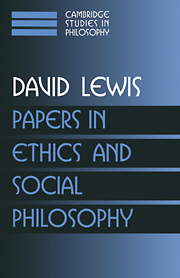Book contents
- Frontmatter
- Contents
- Introduction
- 1 Semantic analyses for dyadic deontic logic
- 2 A problem about permission
- 3 Reply to McMichael
- 4 Why ain'cha rich?
- 5 Desire as belief
- 6 Desire as belief II
- 7 Dispositional theories of value
- 8 The trap's dilemma
- 9 Evil for freedom's sake?
- 10 Do we believe in penal substitution?
- 11 Convention: Reply to Jamieson
- 12 Meaning without use: Reply to Hawthorne
- 13 Illusory innocence?
- 14 Mill and Milquetoast
- 15 Academic appointments: Why ignore the advantage of being right?
- 16 Devil's bargains and the real world
- 17 Buy like a MADman, use like a NUT
- 18 The punishment that leaves something to chance
- 19 Scriven on human unpredictability (with Jane S. Richardson)
- Index
4 - Why ain'cha rich?
Published online by Cambridge University Press: 24 December 2009
- Frontmatter
- Contents
- Introduction
- 1 Semantic analyses for dyadic deontic logic
- 2 A problem about permission
- 3 Reply to McMichael
- 4 Why ain'cha rich?
- 5 Desire as belief
- 6 Desire as belief II
- 7 Dispositional theories of value
- 8 The trap's dilemma
- 9 Evil for freedom's sake?
- 10 Do we believe in penal substitution?
- 11 Convention: Reply to Jamieson
- 12 Meaning without use: Reply to Hawthorne
- 13 Illusory innocence?
- 14 Mill and Milquetoast
- 15 Academic appointments: Why ignore the advantage of being right?
- 16 Devil's bargains and the real world
- 17 Buy like a MADman, use like a NUT
- 18 The punishment that leaves something to chance
- 19 Scriven on human unpredictability (with Jane S. Richardson)
- Index
Summary
Some think that in (a suitable version of) Newcomb's problem, it is rational to take only one box. These one-boxers think of the situation as a choice between a million and a thousand. They are convinced by indicative conditionals: if I take one box I will be a millionaire, but if I take both boxes I will not. Their conception of rationality may be called V-rationality; they deem it rational to maximize V, that being a kind of expected utility defined in entirely non-causal terms. Their decision theory is that of Jeffrey [2].
Others, and I for one, think it rational to take both boxes. We two-boxers think that whether the million already awaits us or not, we have no choice between taking it and leaving it. We are convinced by counterfactual conditionals: If I took only one box, I would be poorer by a thousand than I will be after taking both. (We distinguish normal from back-tracking counterfactuals, perhaps as in [4], and are persuaded only by the former.) Our conception of rationality is U-rationality; we favor maximizing U, a kind of expected utility defined in terms of causal dependence as well as credence and value. Our decision theory is that of Gibbard and Harper [1], or something similar.
The one-boxers sometimes taunt us: if you're so smart, why ain'cha rich? They have their millions and we have our thousands, and they think this goes to show the error of our ways. They think we are not rich because we have irrationally chosen not to have our millions.
- Type
- Chapter
- Information
- Papers in Ethics and Social Philosophy , pp. 37 - 41Publisher: Cambridge University PressPrint publication year: 1999



